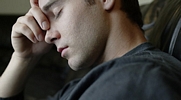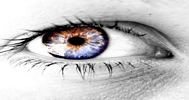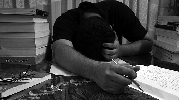Sleep disorders are the abnormalities of the sleep process which leave us feeling tired and sleepy when we need to be awake. About one fourth of Americans report that they get less than six hours of sleep per night. This is probably insufficient to leave them feeling alert. When one is sleepy there is decreased productivity in the workplace, increase in auto and other accidents, adverse effects on interpersonal relationships, and mood disorders resembling psychiatric conditions. The other consistent statistical and clinical finding is that sleep disorders are associated with cardiovascular disease, hypertension, obesity, and depression.
Most people know that sleep is an active brain process which involves much more than simply an off/on phenomenon. There are five different stages of sleep, and an insufficiency in any of them leads to decreased sleep quality. An entire sleep cycle of all the stages takes 90 to 110 minutes. A restful sleep might comprise 4 or 5 cycles. Stage 1 is light sleep, drifted into and out of, from which one is easily awakened. The sleeper often has muscle contractions, and may awaken with a sense of falling. In Stage2, which comprises 50% of sleep, brain activity slows down, the eyes stop moving, and there is only an occasional rapid burst of brain activity. In Stage 3, one is in a deep sleep in which all eye movement ceases, and there is occasional delta wave activity (a delta wave represents an extremely slow brain wave). In Stage 4, an even deeper sleep, almost all brain waves are delta; this is the stage in which children may experience bedwetting, sleep walking, and night terrors. In the final stage, REM, the eyes move rapidly, muscles stiffen; there is an increase in heart rate, blood pressure and breathing, and dreaming takes place. There are somewhere near a hundred sleep abnormalities based on these stages of sleep, and the cycles which they comprise.
Insomnia is usually a difficulty in entering Stage 1 sleep, or awakening from it in subsequent sleep cycles, i.e., can't go to sleep or wakes up too early. There can be a number of possible reasons for this. One might be the use of stimulants such as caffeine, nicotine, or perhaps the pseudoephedrine in the cold medicine. One can be from distraction, for instance, the television going or the proximity to other sources of noise. Sometimes the sleep specialists talk about someone in a hyper-aroused state from anxiety, rumination, or just inability to resolve a troubling situation. A solution in these cases would be to avoid stimulants if one is having trouble sleeping and to arrange a peaceful, relaxing place for sleep where one decides to forego this sort of anxiety- producing thought. There are also certain types of food which stimulate alertness and interfere with sleep, and once identified, these can be avoided. This is a time when, if it is a short term disorder, a hypnotic or other sleep medication might be prescribed for temporary insomnia.
There are about one-hundred different sleep disorders which are associated with abnormalities with certain stages of the sleep cycle. One relatively common one is Restless Legs Syndrome, or Periodic Limb Movement Disorder. This is manifest by uncomfortable feelings in the legs when one is sitting or lying down. The discomfort can feel like tingling, crawling, burning, aching or creeping which is relieved somewhat by moving the legs. It can subconsciously and consciously awaken someone many times per night, leaving one drowsy during the day. Treatment involves the tenets of good sleep hygiene, which are avoiding caffeine, getting regular exercise, cutting back on alcohol and tobacco, and creating that comfortable and relaxing sleeping place which is really not used for anything else except sleep and sexual activity. There are several different medicines which help, but one of the most effective ones now prescribed is Gabapentin, an anti-seizure medicine.
One sleep disorder that has gotten a lot of attention is sleep apnea. In this disorder one actually stops breathing, either through an upper airway problem or by a central apnea. Each time one stops breathing he temporarily wakes up, and this can be up to several hundred times a night. Upper airway problems include severe snoring or collapse of soft tissues around the windpipe when one is asleep. Treatment includes use of a CPAP machine which keeps positive pressure in the airway and thus prevents collapse.
One other sleep disorder to be mentioned because it can cause such disabling daytime sleepiness is narcolepsy. In this disorder one goes rapidly from Stage 1 sleep to REM sleep, effectively bypassing the other stages of deep sleep. A person with this can have sleep attacks when driving or doing other activities that can truly endanger them. The treatment is the use of daytime stimulants to prevent the sleep attacks.
This is a brief description of three of the most common sleep disorders, mainly focusing on insomnia. If you think you are having one, talk with your physician who may decide to refer you to a sleep study specialist. Confirmatory testing usually involves being observed sleeping at a Center with EEG attached, and other monitors such as blood pressure, EKG, and leg muscle activity. Practice good sleep hygiene, and avoid self-treatment with OTC sleep aids for more than short term. Remember that insufficient or disordered sleep can impair you in many ways, and there are many contemporary and effective treatments.



